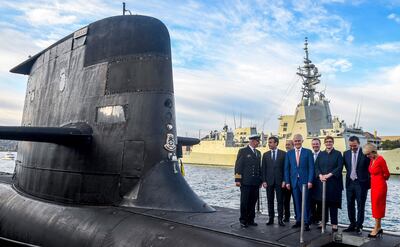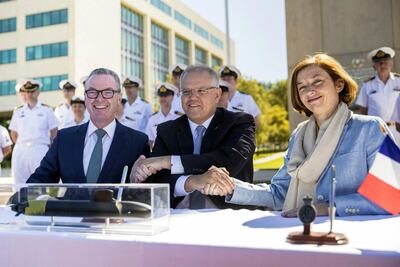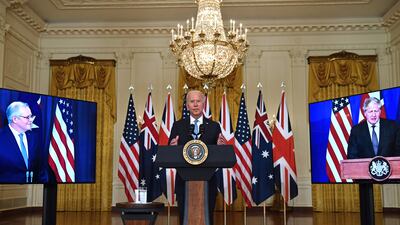France has reacted with fury after the UK, US and Australia signed a defence pact that sidelines Paris in the Indo-Pacific region.
As part of the deal, Australia is tearing up a submarine contract with France and will instead build nuclear-powered vessels with British and American help.
The so-called Aukus pact leaves Paris out in the cold despite France’s efforts to position itself as a power in the Indo-Pacific.
Responding to the announcement, France’s foreign and defence ministers said it “shows a lack of coherence that France can only acknowledge and regret”.
The ministers criticised what they described as “the American choice to push aside a European ally and partner… at a time when we are facing unprecedented challenges in the Indo-Pacific region”.
“It is a decision contrary to the letter and spirit of the co-operation with prevailed between France and Australia,” they said.
In more strongly-worded comments on Thursday, Foreign Minister Jean-Yves Le Drian told French radio that the move was “a stab in the back”.
“I’m very angry today, and bitter… this is not something allies do to each other,” he said.
Referring to the former US president, he said: “This sudden and unforeseeable decision very much recalls what Mr Trump would do.”
Australia ordered 12 submarines from French contractor Naval Group under the agreement made in 2016 which is now being scrapped.
Scott Morrison, Australia’s Prime Minister, sought to avoid a rift by reassuring France that it was still a “key friend and partner”.
He said nuclear-powered submarines had superior speed, endurance and weapons storage compared to the conventional ones ordered from France. He stressed that Australia was not seeking nuclear weapons.
But he acknowledged that the overnight announcement was a “very difficult and disappointing decision for France”.
“As a Prime Minister I must make decisions that are in Australia's national security interests. I know that France would do the same,” he said.

The deal with France had faced tensions before Wednesday’s announcement. Ministers had promised to ramp up industrial production last year.
Arnaud Danjean, a French politician and member of an EU Indo-Pacific delegation, placed the blame at the feet of Australian contractors.
“Putting the blame on the French group is totally unfair and untrue,” he said.
Benjamin Haddad, the head of the Europe Centre at the Atlantic Council think tank, said that “everyone in Paris is shell-shocked” by the decision.
He described it as the lowest point in US-France relations since 2003, when the two countries were at odds over the Iraq War, and a “major setback to a transatlantic strategy on China”.
Gerard Araud, a former French ambassador to the US, said: “The world is a jungle. France has just been reminded [of] this bitter truth by the way the UK and US have stabbed her in the back in Australia.”
The uproar comes on the day that the EU is expected to unveil its new strategy for engaging with the Indo-Pacific.
Britain laid out plans for its own Indo-Pacific tilt in a landmark defence and security review published in March.
The pact was widely seen as an effort to counter China, which responded by accusing the Aukus countries of having a “Cold War mentality”.
Australia is set to become the first country without nuclear weapons to obtain nuclear-armed submarines. The Aukus countries have also promised to deepen intelligence-sharing and integrate their supply chains.

UK Prime Minister Boris Johnson linked the alliance to his domestic agenda, promising that Aukus would create hundreds of highly skilled jobs across the country.
"We will have a new opportunity to reinforce Britain’s place at the leading edge of science and technology, strengthening our national expertise," Mr Johnson said.
"And perhaps most significantly, the UK, Australia and the US will be joined even more closely together, reflecting the measure of trust between us."
UK Defence Secretary Ben Wallace said it was natural that Australia would have turned to the UK and US because of its existing co-operation under the Five Eyes intelligence alliance, which also includes Canada and New Zealand.
“This is not a betrayal,” he told BBC radio on Thursday. “This is simply that the Australians have chosen a different strategic capability than the one they had originally planned for.
“I understand strongly the French disappointment, but there has been no sort of sneaking around behind people’s backs.
“France and Britain are incredibly important partners, not only in Europe, but also globally. We agree on so many things.”
Calls for Europe to reduce its reliance on the US have been growing since the fall of Afghanistan. The EU plans to convene a defence summit with France next year.
The French ministers said the submarine decision “only reinforces the need to raise the issue of European strategic autonomy loud and clear”.
“There is no other credible way to defend our interests and our values in the world, including in the Indo-Pacific,” they said.


